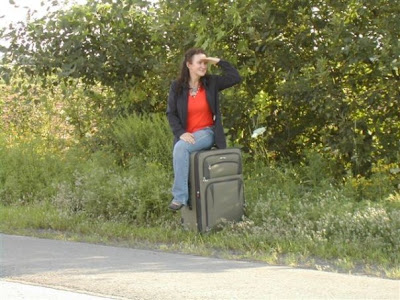There are certain people to whom I would merrily sit and listen utterly captivated as they told tales for hours and hours at a time. Wanda Carroll is one such person. Carroll presents her one-woman monologue Beyond the Road Less Gravelled at the Imperial Studio at Neptune Theatre this Atlantic Fringe, the sequel to the show she presented here in 2007. Both shows chronicle Carroll’s life in the excruciatingly small and rural town of Conche, Newfoundland, and Beyond the Road Less Gravelled features stories of Carroll between the age of eighteen and twenty-five. For this reason, she had to give a quick recap of her life thus far to provide context for those in the audience who had not seen the show centered on her childhood. I’m sorry to have missed her last show. I’m sure it would have been hilarious; the recap was brilliant and the perfect taste of the adventures to come!
Carroll has a talent for hopping between telling the stories in the present and dramatizing stories from the past seamlessly. The entire monologue flows logically and the dramatizations help to enhance the tales and create vivid, clear pictures of rural Newfoundland and Halifax in the early 1980s in the imaginations of the audience. She has minimal props, and no set to speak of, but her descriptions are so precise, the mind provides an airplane, a bus, a school residence, and a pub for Carroll with ease. It becomes even more impressive when one learns that Carroll does not rehearse her shows, but speaks freely on these subjects in an improvised style.
Some of the stories that Carroll tells are unbelievable. How many people experience their first hangover at the age of four, after all? How many of us have been robbed by a random cancer survivor we met in a bar? Some of the humour stems from Carroll’s language, specifically her Newfoundland dialect, which almost becomes its own character in the piece. At the heart of the piece, however, Carroll speaks to an experience that is entirely familiar; the quest for that “eureka!” moment when the future suddenly makes sense and winds out in front of us as a pathway paved with yellow bricks. Soul searching and confusion make for hilarious anecdotes, along with being a gluttonous whore for food.
At the end of Wanda Carroll’s monologue, she stopped talking and took a bow and the audience clapped politely and then each one remained in his or her seat, still poised to hear the rest of the stories Carroll has milling about her memory. No one wanted to be the first person to break the magic spell that had been cast in the Imperial Studio and I’m sure the whole audience would have happily stayed for another hour, and maybe more if some pizza and rum and coke had been provided.
Carroll has a talent for hopping between telling the stories in the present and dramatizing stories from the past seamlessly. The entire monologue flows logically and the dramatizations help to enhance the tales and create vivid, clear pictures of rural Newfoundland and Halifax in the early 1980s in the imaginations of the audience. She has minimal props, and no set to speak of, but her descriptions are so precise, the mind provides an airplane, a bus, a school residence, and a pub for Carroll with ease. It becomes even more impressive when one learns that Carroll does not rehearse her shows, but speaks freely on these subjects in an improvised style.
Some of the stories that Carroll tells are unbelievable. How many people experience their first hangover at the age of four, after all? How many of us have been robbed by a random cancer survivor we met in a bar? Some of the humour stems from Carroll’s language, specifically her Newfoundland dialect, which almost becomes its own character in the piece. At the heart of the piece, however, Carroll speaks to an experience that is entirely familiar; the quest for that “eureka!” moment when the future suddenly makes sense and winds out in front of us as a pathway paved with yellow bricks. Soul searching and confusion make for hilarious anecdotes, along with being a gluttonous whore for food.
At the end of Wanda Carroll’s monologue, she stopped talking and took a bow and the audience clapped politely and then each one remained in his or her seat, still poised to hear the rest of the stories Carroll has milling about her memory. No one wanted to be the first person to break the magic spell that had been cast in the Imperial Studio and I’m sure the whole audience would have happily stayed for another hour, and maybe more if some pizza and rum and coke had been provided.
When Carroll was eighteen years old, she dreamt of running away to Halifax to “be someday.” I think it’s safe to say that with this show, that dream is after comin’ true.
Venue: Neptune’s Imperial Room. $10.00
Times: Sun Sept 6 at 6:30pm, Mon Sept 7 at 1:50pm, Fri Sept 11 at 7:50pm, Sat Sept 12 at 2pm, Sat Sept 12 at 8:20pm, Sun Sept 13 at 1:40pm, Sun Sept 13 at 6:40pm.






 World Theatre Day: My God Is It Ever The Time to Invest in Canadian Plays
World Theatre Day: My God Is It Ever The Time to Invest in Canadian Plays 